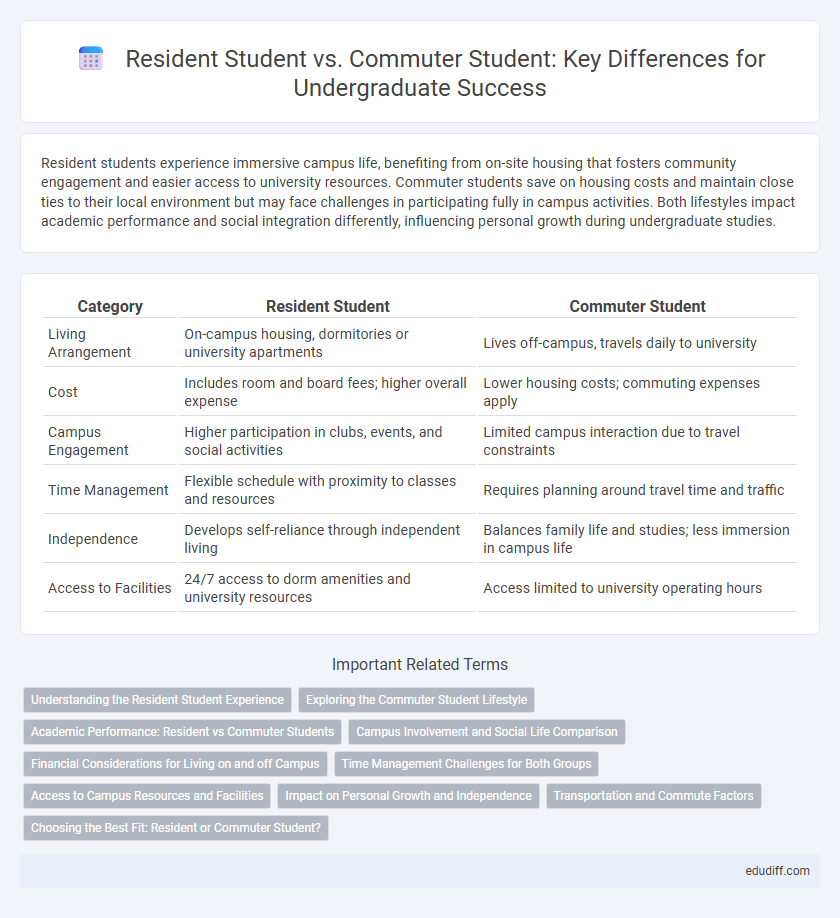Resident students experience immersive campus life, benefiting from on-site housing that fosters community engagement and easier access to university resources. Commuter students save on housing costs and maintain close ties to their local environment but may face challenges in participating fully in campus activities. Both lifestyles impact academic performance and social integration differently, influencing personal growth during undergraduate studies.
Table of Comparison
| Category | Resident Student | Commuter Student |
|---|---|---|
| Living Arrangement | On-campus housing, dormitories or university apartments | Lives off-campus, travels daily to university |
| Cost | Includes room and board fees; higher overall expense | Lower housing costs; commuting expenses apply |
| Campus Engagement | Higher participation in clubs, events, and social activities | Limited campus interaction due to travel constraints |
| Time Management | Flexible schedule with proximity to classes and resources | Requires planning around travel time and traffic |
| Independence | Develops self-reliance through independent living | Balances family life and studies; less immersion in campus life |
| Access to Facilities | 24/7 access to dorm amenities and university resources | Access limited to university operating hours |
Understanding the Resident Student Experience
Resident students often benefit from immersive campus involvement, fostering stronger social connections and easier access to academic resources. Living on campus enables participation in extracurricular activities, leading to enhanced personal growth and a more integrated college experience. This residential environment supports time management and independence, contributing to higher retention and academic success rates.
Exploring the Commuter Student Lifestyle
Commuter students balance academics with managing daily travel, often developing strong time-management skills due to longer transit times between home and campus. Unlike resident students, commuters typically save on housing costs but may face challenges in accessing campus resources and social events. Universities often provide tailored support services, such as commuter lounges and flexible scheduling, to enhance their academic experience and foster community engagement.
Academic Performance: Resident vs Commuter Students
Resident students often experience higher academic performance due to increased access to campus resources, social support networks, and study groups. Commuter students may face challenges such as longer travel times and less integration into campus life, which can impact their engagement and academic outcomes. Studies indicate that the immersive environment for resident students fosters better concentration and participation, contributing to improved grades.
Campus Involvement and Social Life Comparison
Resident students experience higher campus involvement, participating actively in clubs, events, and on-campus activities due to convenient access to facilities. Commuter students often face limitations in social life, balancing travel time and external commitments, which can reduce their engagement in campus community interactions. The immersive environment for resident students fosters stronger social networks and a deeper sense of belonging compared to the often transient connections of commuter students.
Financial Considerations for Living on and off Campus
Resident students typically incur higher housing costs due to on-campus room and board fees, which can range from $8,000 to $12,000 per academic year, but benefit from included utilities and meal plans. Commuter students save on housing expenses by living off campus, often reducing overall living costs, yet may face transportation costs averaging $500 to $1,200 annually depending on distance and mode of transit. Financial aid packages and scholarships sometimes specifically cover on-campus housing, making it essential for students to evaluate both direct and ancillary expenses when deciding between residency options.
Time Management Challenges for Both Groups
Resident students often struggle with balancing social activities and academic responsibilities, leading to irregular study schedules. Commuter students face time management challenges related to long travel times, which reduce available study and rest periods. Both groups must develop effective strategies to optimize their limited time and maintain academic performance.
Access to Campus Resources and Facilities
Resident students typically have 24/7 access to campus resources and facilities such as libraries, computer labs, and recreational centers, which enhances their academic and social engagement. Commuter students might face time constraints due to travel, limiting their ability to fully utilize these amenities during operating hours. Universities often offer extended hours or online resources to help commuter students bridge the access gap.
Impact on Personal Growth and Independence
Living on campus as a resident student fosters greater personal growth by encouraging daily self-reliance, time management, and social interaction, leading to enhanced independence. Commuter students may have limited opportunities for immersive campus involvement, which can affect their development of autonomy outside the family environment. Research indicates resident students often report higher levels of confidence and adaptability due to constant engagement with diverse experiences and responsibilities.
Transportation and Commute Factors
Resident students benefit from on-campus housing that eliminates daily commute times, allowing immediate access to university facilities and events. Commuter students face variable transportation challenges, such as traffic congestion, parking availability, and reliance on public transit schedules, which can impact punctuality and overall campus engagement. Efficient campus shuttle services and proximity to transit hubs are critical factors influencing commuter student satisfaction and retention rates.
Choosing the Best Fit: Resident or Commuter Student?
Choosing between resident and commuter student status depends on factors like campus involvement, academic focus, and lifestyle preferences. Resident students benefit from immersive campus experiences, greater social interaction, and easier access to academic resources, while commuter students often save on housing costs and maintain strong local community ties. Evaluating personal priorities such as convenience, budget, and desired campus engagement ensures the best fit for academic success and overall college experience.
Resident Student vs Commuter Student Infographic

 edudiff.com
edudiff.com